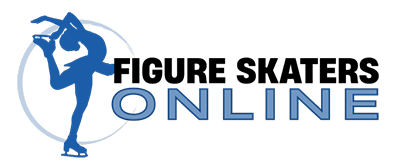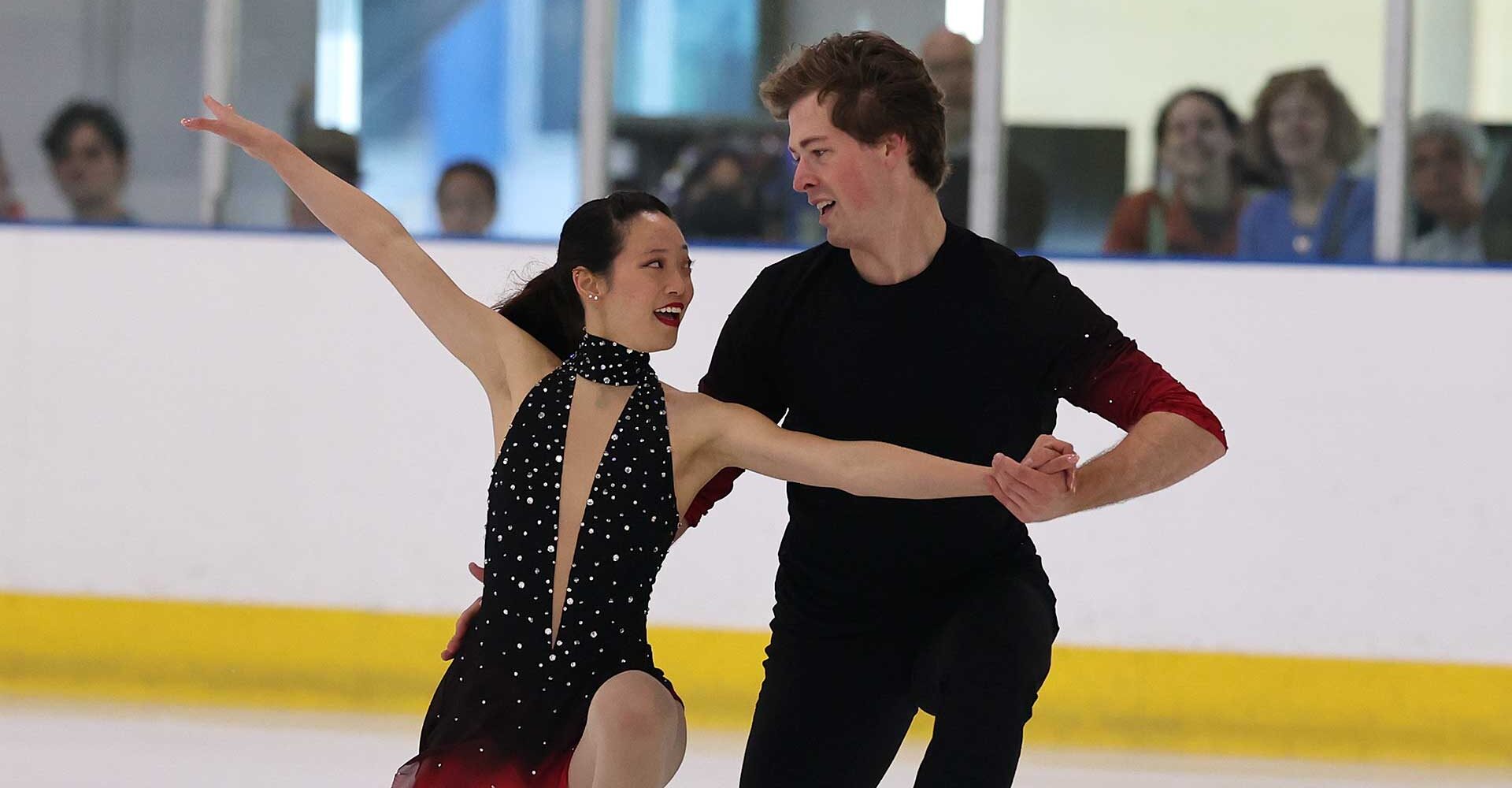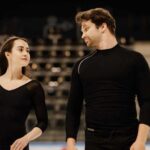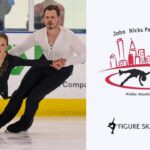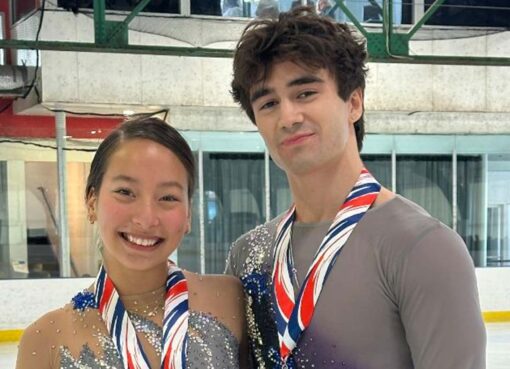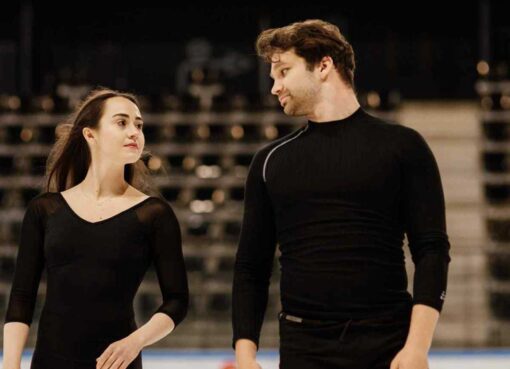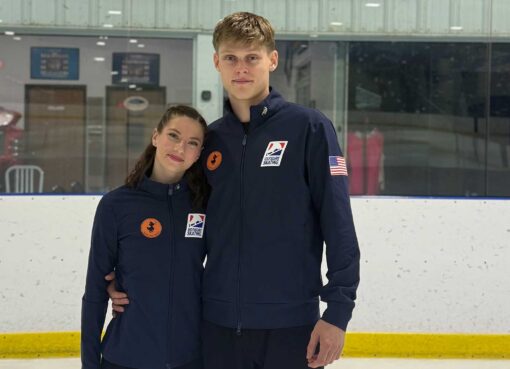By Gina Capellazzi, Team FSO website administrator
Photos by Robin Ritoss
Figure Skaters Online has started a new series to introduce fans to the new pair teams who will be making their debut during the 2025-26 season. For this series, we recently chatted with Chelsea Liu and Ryan Bedard, who are a new team for the U.S. Ryan finished 9th at the 2025 U.S. Championships with former partner, Isabelle Martins. Before taking a season off to focus on her mental health, Chelsea Liu was the 2023 Skate America bronze medalist and 2024 U.S. national pewter medalist with former partner, Balazs Nagy.
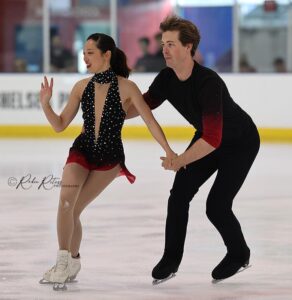 Tell us about your individual skating journeys, including any early special memories.
Tell us about your individual skating journeys, including any early special memories.
Chelsea: I began skating at the age of 6, inspired by my older sister, Chaochih Liu, who competed in singles for Taiwan. She’s always been a huge role model for me—I wanted to do everything she did and be just like her. In 2008, my sister and mom were in a serious car accident, which left Chaochih with a bulging disc in her spine. Even though she continued competing for a while, the injury affected her deeply, and she ultimately decided to retire during her college years. Ever since then, I’ve wanted to carry on her dream in skating—her dream really became my own. It’s always been my motivation to make her proud and continue our family’s journey in the sport.
Ryan: I started skating when I was old enough to walk, because my mom is a coach, and I competed in singles until I was 17. I attended several junior nationals and nationals as a singles skater, and those early years provided me with a solid foundation in the sport. One of my favorite memories from that time is learning how to do a back flip on the ice—a moment that really sums up my love of the challenge and excitement that skating has always brought to my life.
What drew you to pairs? Did you compete in singles before and if so, how long did you skate and compete as a single skater?
Chelsea: What really drew me to pairs was the idea of not being alone out on the ice. I did gymnastics when I was younger and have always loved flips and tricks, so pairs gave me the chance to incorporate that excitement on the ice. Twist and lifts are definitely my favorite elements—they make skating so much fun for me. I did compete once in Juvenile girls, but honestly, it wasn’t my strength, and I didn’t enjoy skating alone nearly as much as I enjoy pairs.
Ryan: For me, it was definitely the craziness of the throws, lifts, and twists that first attracted me to pairs. There’s just something really thrilling about those elements that makes pairs unique. Plus, I find it much more calming and enjoyable to share the ice with a partner rather than skating solo. I competed as a singles skater until I was 17, and those years provided a strong technical foundation before I made the switch to pairs.
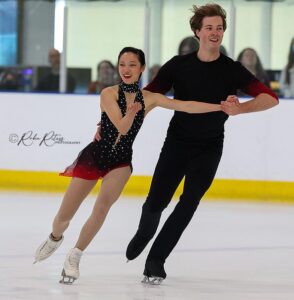 Tell us how your partnership started.
Tell us how your partnership started.
Chelsea: Our partnership came together pretty naturally. Back in February, Ryan had just ended his previous partnership, and I had just started skating again, mostly focusing on getting back into shape. We were both doing tryouts with other people, but in between, we’d occasionally practice lifts and throws together to help each other prepare for our respective tryouts.
At the end of May, we started skating together a bit more consistently so we’d both be ready for the season if we were able to find partners. Then, in June, after our other tryouts didn’t pan out the way we’d hoped, we decided to try all the other elements together to see if there was potential. Once we did that, it became clear that we had a solid foundation, and that’s when we officially decided to team up.
Chelsea, you took a break from skating to focus on your mental health. If you are willing, can you share what you did during that break and how you worked on your mental health? Why did you decide to come back to skating? What did you learn from your time away from the sport?
Chelsea: It was never my intention to step away from skating; I always wanted to continue competing. However, I found myself in a situation that brought me more pain than happiness. While making sacrifices is part of any career, I eventually realized where “the line” was for me—I was not willing to sacrifice my mental well-being for success in sport. During this period, I dedicated that time to truly understanding what I needed both as an athlete and as a person outside of sport. I focused on creating routines that brought me peace—spending quality time with my family and dogs, reading, enjoying the outdoors, and reconnecting with things that brought me joy and perspective. I also worked on my mental wellness by seeking professional support, being open about my experiences, and building strategies to better manage stress and expectations. Therapy and self-reflection helped me process my experiences and develop healthier coping strategies for addressing challenges.
After ending my last partnership, I continued training and searching for new partners through tryouts, but I didn’t find the right fit in time for the season, which eventually led me to fall out of training and shift my focus to coaching. During that time, I had the incredible opportunity to teach and develop an ice dance team representing Taiwan, my parents’ home country. This was a brand new experience for me, as I hadn’t taught ice dance before, and neither of the skaters had any prior experience in ice dance or partnering. With the support of my long-time coach, Christine Fowler-Binder, and Olympian Yura Min, I gained a wealth of knowledge about the world of ice dance. Being on the other side of the boards gave me a new perspective on partnerships, resilience, and mental well-being.
From my time away, I learned the importance of listening to yourself and not being afraid to step back when needed. Making a business decision based on personal happiness rather than results and potential success was an act of self-care, not weakness—it taught me resilience, self-compassion, and that prioritizing mental health is crucial for long-term happiness and success, both in and out of sport. Setting boundaries and putting my well-being first allowed me to return to skating with renewed purpose, balance, and appreciation for all aspects of the journey.
Ryan, would you be willing to share what happened with your partnership Isabelle Martins?
Ryan: Ending my partnership with Isabelle was a very difficult decision as I have a great deal of respect for her both as a person and as a teammate. Over time, I felt that we had reached a point where we were no longer progressing as a team, and I found myself wanting to take on new challenges and strive for higher goals in my skating. I believed that making a change was necessary not only for my own growth and improvement, but also to give both of us the opportunity to continue developing and achieving our full potential. I’m grateful for everything Isabelle and I accomplished as partners over the years.
What is it that you already like most about skating with your new partner?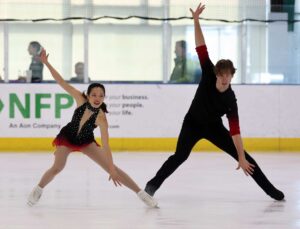
Chelsea: What I already like most about skating with Ryan is how genuinely supportive he is. One of his biggest strengths is being conscious and receptive to feedback on how he can better support me on a day-to-day basis. Everyone’s idea of support is different, and it’s been refreshing to have someone truly listen to my needs and consistently make the effort to help me thrive and grow, both as a person and as an athlete. That level of care and communication is something I deeply appreciate and value in our partnership.
Ryan: What I already like most about skating with Chelsea is her incredible determination and work ethic. She never gives up, no matter the circumstances, and that kind of drive inspires me every day. I really value that we can train super hard together and push each other to improve, but we also find ways to laugh and have fun in the process. That balance between dedication and enjoying the journey is something I truly cherish in our partnership.
What experiences do each of you bring to the partnership? (International competitions, training, etc.).
Chelsea and Ryan: We both bring extensive international competition experience at the highest level to our partnership. We understand firsthand the pressure and high standards that come with skating against some of the best athletes in the sport. That background helps us support each other, stay focused under pressure, and bring a resilient mindset to our training and performances.
What has been the biggest adjustment for each of you so far in the partnership?
Chelsea: For me, the biggest adjustment has been finding the right rhythm and connection in a new partnership after some time away from full competition. It’s about building trust, communication, and understanding each other’s timing and style on the ice. That process has been both challenging and rewarding, and it’s exciting to see how we’re growing stronger together every day.
Ryan: The biggest adjustment for me so far has been working hard to improve and refine my technique on the elements I’ve struggled with throughout my career. I’ve already made improvements in a short time, and I’m motivated to continue pushing myself and showing everyone the hard work I’ve been putting in.
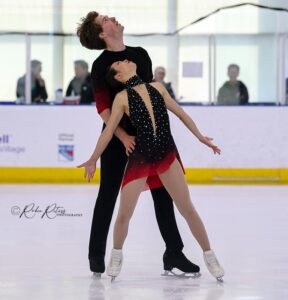 Tell us about your training site.
Tell us about your training site.
Chelsea and Ryan: We train at Great Park Ice & FivePoint Arena in sunny Irvine, California!
Who are your coaches? Did either or both have to relocate? If so, tell us about the move(s).
Chelsea and Ryan: Pairs: Jenni Meno, Brandon Frazier, & Christine Fowler-Binder
Singles: Chris Pottenger
Neither of us had to relocate, which was a big plus. We were fortunate that we both already trained at the same camp and had extensive pairs experience, so we could get started right away without any major changes to our daily routines.
Who is choreographing your programs. Is someone else arranging your music? If so, please share those experiences.
Chelsea and Ryan: Our short program was choreographed by Yura Min and our free program was choreographed by Brandon Frazier.
We both work extremely well together when learning choreography and tend to pick up new material quite quickly. Our similar skating styles have made the choreography process seamless and efficient, which we really appreciate. We had a lot of fun working with Yura and Brandon on our programs this season, and we’re excited to continue developing those programs as the season progresses. Their input has helped us bring out the best in our style and performance, and we look forward to seeing how our programs evolve.
What are you skating to this year, if you would like to share with us?
Chelsea and Ryan: Our short program is “Angel of Small Death” and the “Codeine Scene” by Hozier and our free program is “Two Men in Love” by The Irrepressibles.
If you could have a lesson with any pair skater past/present, who would it be? Why?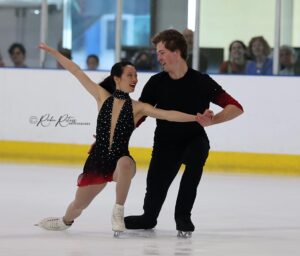
Chelsea and Ryan: If we could have a lesson with any pair skater, past or present, without hesitation, our choice would be to have a lesson with our coach, Todd Sand. As many people know, Todd had a major health incident a few years ago, and we’re just so deeply grateful he’s still here with us today. We miss learning from him dearly.
Chelsea: Todd’s absence in my skating career has been truly heartbreaking. I started my competitive pairs journey with Todd and Jenni at just 10 years old – they’ve supported me through every stage, not only on the ice but personally as well. Todd and Jenni have watched me grow from a little girl learning the basics all the way into adulthood, and have walked beside me through my best and worst moments. I genuinely wouldn’t be the person or athlete I am today without them. Todd is like a second father to me, and not having him by the boards now is incredibly difficult. I would give anything to be able to have another lesson with him.
Ryan: Even though I only got to work with Todd for a short time after moving to California, that period had a big impact on me. Todd was an amazing coach—he supported me and believed in me, especially at times when it felt like no one else did. He taught me not only technical skills, but also perseverance and self-belief. Todd creates a culture of support and excellence that’s rare in sport, and I’d love any opportunity to learn from him again—whether for his expertise, his positivity, or the way he brings out the best in his skaters.
What is each of you looking forward to most this skating season? What will be your biggest challenge(s)?
Chelsea and Ryan: We’re incredibly excited for this season, especially since it’s an Olympic year, which brings a heartwarming level of energy from both skaters and audiences. We’re most looking forward to the chance to compete at a high level and to grow together as a partnership. Every competition is a new opportunity, and we can’t wait to see how we develop throughout the season. We’re eager to share our new programs, connect with audiences, and make lasting memories together. It feels special to be back, and we really want to make the most of every moment.
Our biggest challenge will be making sure we stay healthy and pace ourselves mentally and physically throughout a demanding schedule. Communication and teamwork will be essential as we navigate the ups and downs together.
Tell us about your debut competition this season?
Chelsea and Ryan: Our first competition this season will be the Golden West Championships at our home rink. This will allow us to earn a score for the National Qualifying Series. We leave the next morning for the John Nicks Pair Challenge in New York, so we’re excited to start off our season with two great opportunities to perform.
(Editor’s Note: Chelsea and Ryan were the only competitors in the senior pairs event at Golden West Championships, and finished in 6th place at the John Nicks Pairs Challenge.)
What are your goals for this season?
Chelsea and Ryan: Our main goals for this season are to show improvement and increased consistency in the elements that have been challenging for both of us in the past. We want to build confidence in these areas so they become strengths for our partnership.

